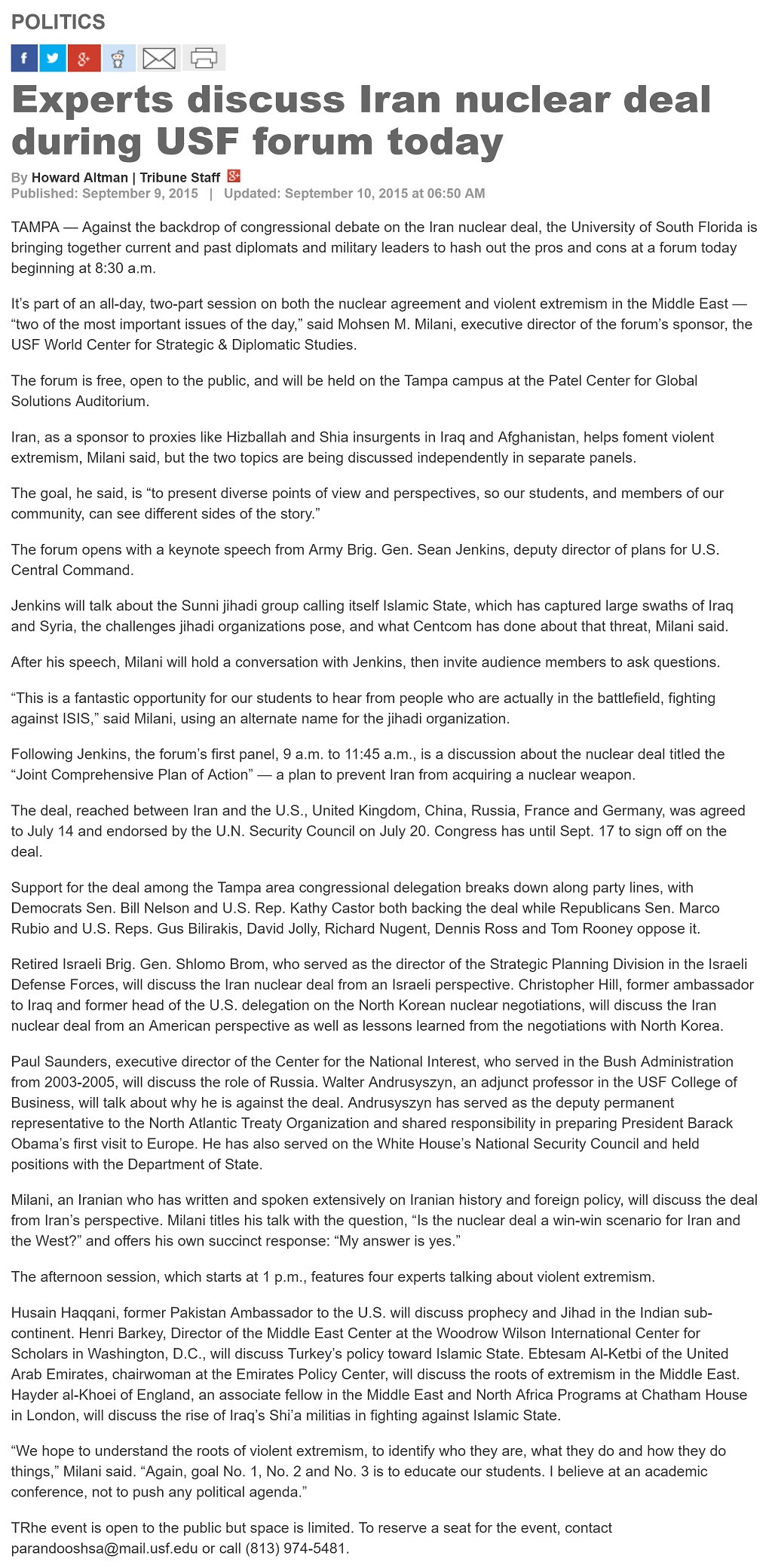
TAMPA — Against the backdrop of congressional debate on the Iran nuclear deal, the University of South Florida is bringing together current and past diplomats and military leaders to hash out the pros and cons at a forum today beginning at 8:30 a.m.
It’s part of an all-day, two-part session on both the nuclear agreement and violent extremism in the Middle East — “two of the most important issues of the day,” said Mohsen M. Milani, executive director of the forum’s sponsor, the USF World Center for Strategic & Diplomatic Studies.
The forum is free, open to the public, and will be held on the Tampa campus at the Patel Center for Global Solutions Auditorium.
Iran, as a sponsor to proxies like Hizballah and Shia insurgents in Iraq and Afghanistan, helps foment violent extremism, Milani said, but the two topics are being discussed independently in separate panels.
The goal, he said, is “to present diverse points of view and perspectives, so our students, and members of our community, can see different sides of the story.”
The forum opens with a keynote speech from Army Brig. Gen. Sean Jenkins, deputy director of plans for U.S. Central Command.
Jenkins will talk about the Sunni jihadi group calling itself Islamic State, which has captured large swaths of Iraq and Syria, the challenges jihadi organizations pose, and what Centcom has done about that threat, Milani said.
After his speech, Milani will hold a conversation with Jenkins, then invite audience members to ask questions.
“This is a fantastic opportunity for our students to hear from people who are actually in the battlefield, fighting against ISIS,” said Milani, using an alternate name for the jihadi organization.
Following Jenkins, the forum’s first panel, 9 a.m. to 11:45 a.m., is a discussion about the nuclear deal titled the “Joint Comprehensive Plan of Action” — a plan to prevent Iran from acquiring a nuclear weapon.
The deal, reached between Iran and the U.S., United Kingdom, China, Russia, France and Germany, was agreed to July 14 and endorsed by the U.N. Security Council on July 20. Congress has until Sept. 17 to sign off on the deal.
Support for the deal among the Tampa area congressional delegation breaks down along party lines, with Democrats Sen. Bill Nelson and U.S. Rep. Kathy Castor both backing the deal while Republicans Sen. Marco Rubio and U.S. Reps. Gus Bilirakis, David Jolly, Richard Nugent, Dennis Ross and Tom Rooney oppose it.
Retired Israeli Brig. Gen. Shlomo Brom, who served as the director of the Strategic Planning Division in the Israeli Defense Forces, will discuss the Iran nuclear deal from an Israeli perspective. Christopher Hill, former ambassador to Iraq and former head of the U.S. delegation on the North Korean nuclear negotiations, will discuss the Iran nuclear deal from an American perspective as well as lessons learned from the negotiations with North Korea.
Paul Saunders, executive director of the Center for the National Interest, who served in the Bush Administration from 2003-2005, will discuss the role of Russia. Walter Andrusyszyn, an adjunct professor in the USF College of Business, will talk about why he is against the deal. Andrusyszyn has served as the deputy permanent representative to the North Atlantic Treaty Organization and shared responsibility in preparing President Barack Obama’s first visit to Europe. He has also served on the White House’s National Security Council and held positions with the Department of State.
Milani, an Iranian who has written and spoken extensively on Iranian history and foreign policy, will discuss the deal from Iran’s perspective. Milani titles his talk with the question, “Is the nuclear deal a win-win scenario for Iran and the West?” and offers his own succinct response: “My answer is yes.”
The afternoon session, which starts at 1 p.m., features four experts talking about violent extremism.
Husain Haqqani, former Pakistan Ambassador to the U.S. will discuss prophecy and Jihad in the Indian sub-continent. Henri Barkey, Director of the Middle East Center at the Woodrow Wilson International Center for Scholars in Washington, D.C., will discuss Turkey’s policy toward Islamic State. Ebtesam Al-Ketbi of the United Arab Emirates, chairwoman at the Emirates Policy Center, will discuss the roots of extremism in the Middle East. Hayder al-Khoei of England, an associate fellow in the Middle East and North Africa Programs at Chatham House in London, will discuss the rise of Iraq’s Shi’a militias in fighting against Islamic State.
“We hope to understand the roots of violent extremism, to identify who they are, what they do and how they do things,” Milani said. “Again, goal No. 1, No. 2 and No. 3 is to educate our students. I believe at an academic conference, not to push any political agenda.”
TRhe event is open to the public but space is limited. To reserve a seat for the event, contact parandooshsa@mail.usf.edu or call (813) 974-5481.
